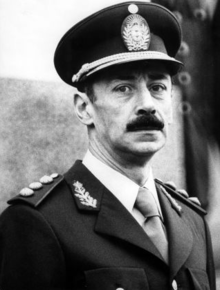Jorge Rafael Videla
| Jorge Rafael Videla | |
|---|---|
 |
|
|
42nd President of Argentina De facto |
|
|
In office 29 March 1976 – 29 March 1981 |
|
| Preceded by | Isabel Martínez de Perón |
| Succeeded by | Roberto Eduardo Viola |
| 124th Governor of Tucumán De facto |
|
|
In office 4 August 1970 – 10 December 1970 |
|
| Preceded by | Jorge Daniel Nanclares |
| Succeeded by | Carlos Alfredo Imbaud |
| Personal details | |
| Born |
2 August 1925 Mercedes, Buenos Aires, Argentina |
| Died | 17 May 2013 (aged 87) Marcos Paz, Buenos Aires, Argentina |
| Nationality | Argentine |
| Political party | None |
| Spouse(s) | Alicia Raquel Hartridge |
| Children | Maria Cristina Jorge Horacio Alejandro Eugenio María Isabel Pedro Ignacio Fernando Gabriel Rafael Patricio |
| Alma mater | Colegio Militar de la Nación |
| Profession | Military |
| Religion | Roman Catholicism |
| Signature | |
| Military service | |
| Allegiance |
|
| Service/branch |
|
| Years of service | 1944–1981 |
| Rank |
|
| Commands | Argentine Army |
| Battles/wars | |
Jorge Rafael Videla (Spanish pronunciation: [ˈxorxe rafaˈel biˈðela]; 2 August 1925 – 17 May 2013) was a senior commander in the Argentine Army and dictator of Argentina from 1976 to 1981.
He came to power in a coup d'état that deposed Isabel Martínez de Perón. In 1985, two years after the return of a representative democratic government, he was prosecuted in the Trial of the Juntas for large-scale human rights abuses and crimes against humanity that took place under his rule, including kidnappings or forced disappearance, widespread torture and extrajudicial murder of activists, and political opponents as well as their families at secret concentration camps. An estimated 13,000-30,000 political dissidents vanished during this period. Videla was also convicted of the theft of many babies born during the captivity of their mothers at the illegal detention centres and passing them on for illegal adoption by associates of the regime. In his defence, Videla maintains the female guerrilla detainees allowed themselves to fall pregnant in the belief they wouldn't be tortured or executed. On 5 July 2010, Videla took full responsibility for his army's actions during his rule. "I accept the responsibility as the highest military authority during the internal war. My subordinates followed my orders," he told an Argentine court. Videla also sheltered many Nazi fugitives along with Juan Perón before him, Alfredo Stroessner of Paraguay and Hugo Banzer of Bolivia. He was under house arrest until 10 October 2008, when he was sent to a military prison.
...
Wikipedia
